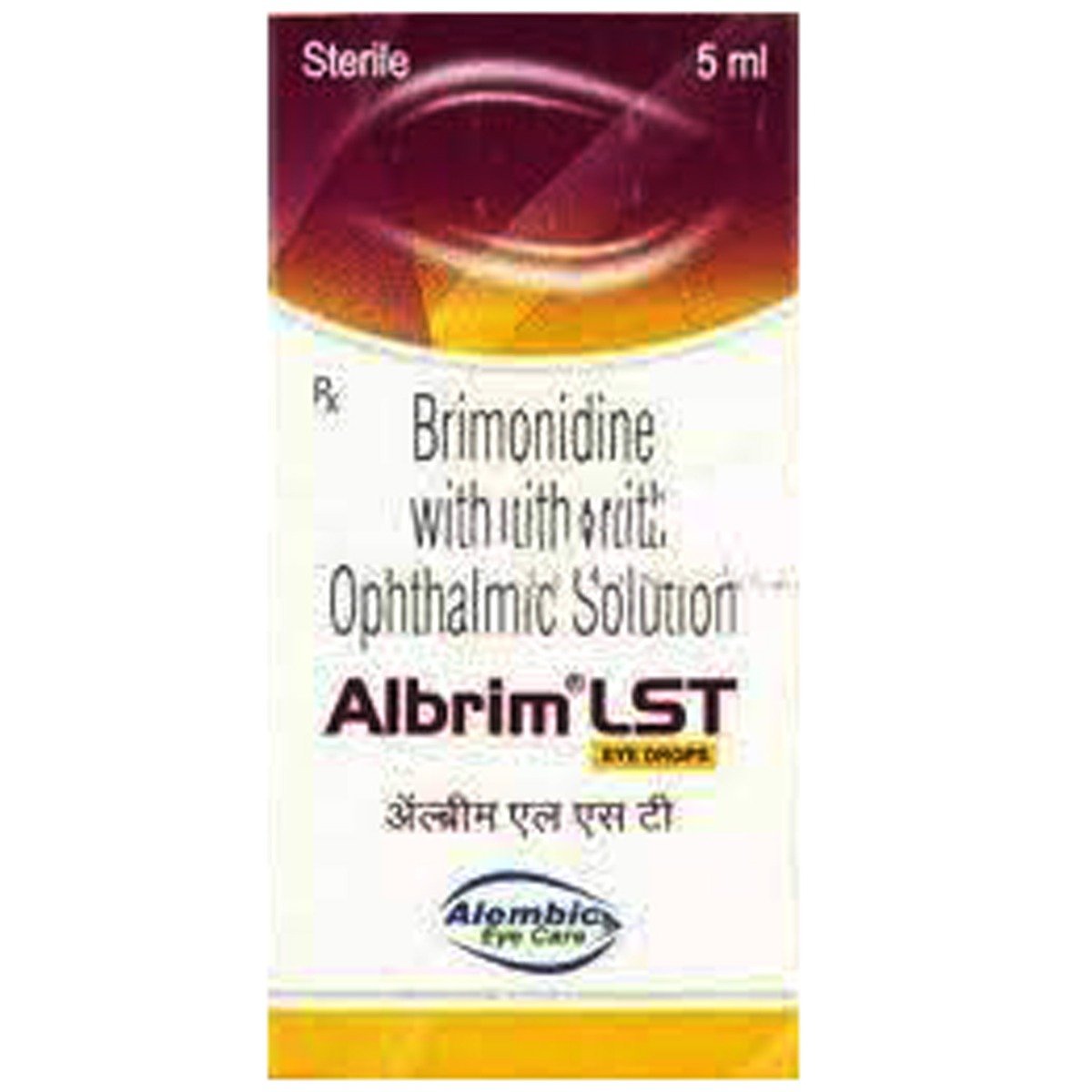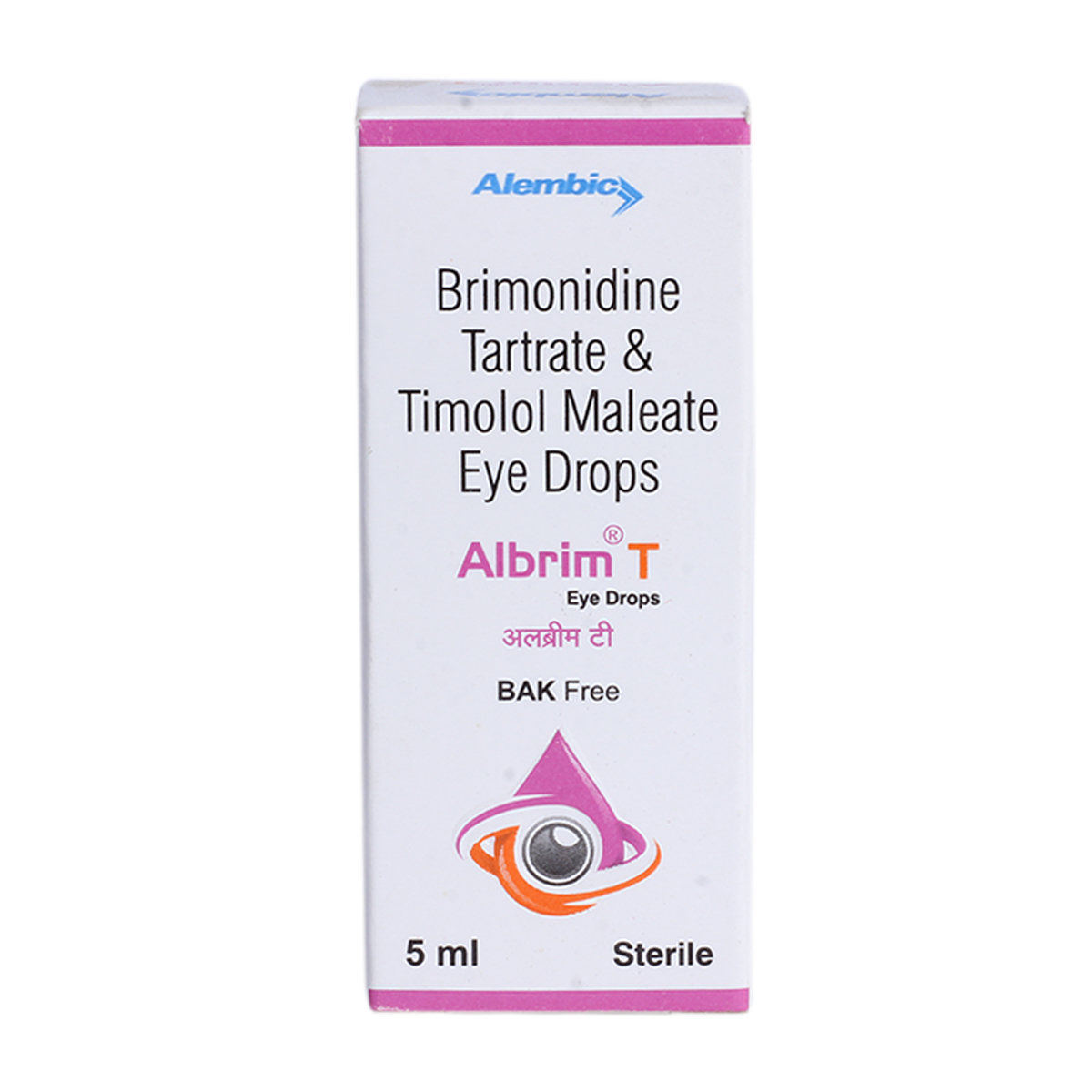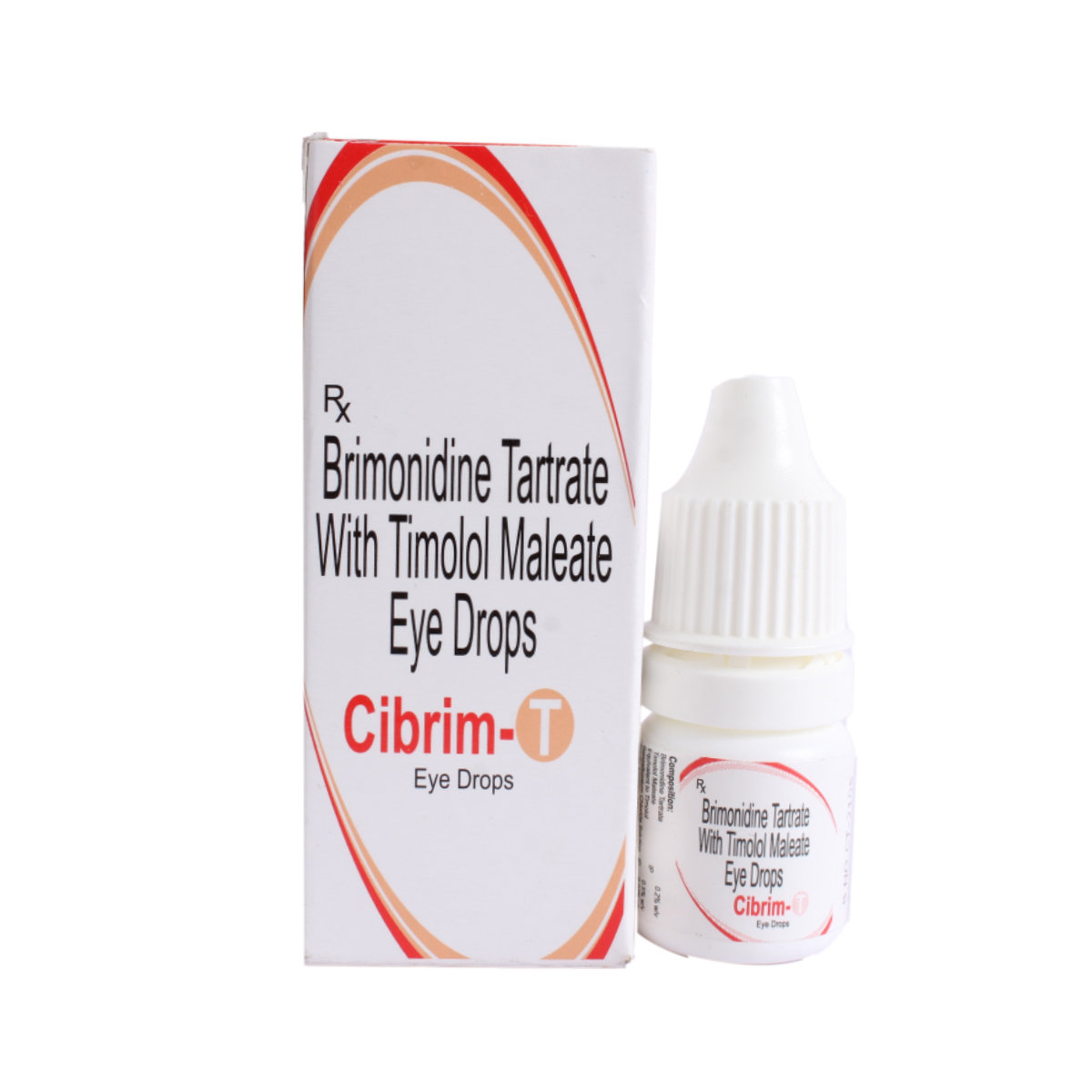Albrim LST Eye Drop 5 ml

MRP ₹74
(Inclusive of all Taxes)
₹11.1 Cashback (15%)
Albrim LST Eye Drop 5 ml is used to treat open-angle glaucoma and high pressure in the eyes (ocular hypertension). It contains Brimonidine and Timolol. It acts by narrowing the blood vessels that reduce the flow of aqueous humour. Also, it decreases the secretion of aqueous humour by acting on the ciliary body in the eye, thereby causing a decrease in the eye pressure. It may cause some common side effects such as itching, stinging sensation, foreign body sensation in the eye, burning sensation in the eye, redness, blurred vision, tiredness, drowsiness, headache, and dryness in the mouth. Before using this medicine, you should tell your doctor if you are allergic to any of its components or if you are pregnant/breastfeeding, and about all the medications you are taking and pre-existing medical conditions.
Know Your Delivery Time
Provide Delivery Location

Secure Payment

India's Most Trusted Pharmacy

Genuine Products
Composition :
Manufacturer/Marketer :
Consume Type :
Return Policy :
Expires on or after :
About Albrim LST Eye Drop 5 ml
Albrim LST Eye Drop 5 ml is used to treat open-angle glaucoma and ocular hypertension (high pressure in the eyes). Glaucoma is a common eye condition where the optic nerve, which connects the eye to the brain, becomes damaged.
Albrim LST Eye Drop 5 ml is a combination of two medicines, namely Brimonidine and Timolol. Brimonidine narrows the blood vessels in the eye and reduces fluid in the eye. Timolol lowers eye pressure by reducing fluid (aqueous humour) made in the eye.
In some cases, Albrim LST Eye Drop 5 ml may cause certain common side effects such as itching, stinging sensation, foreign body sensation, burning sensation, redness, blurred vision, tiredness, drowsiness, headache, and dryness in the mouth. Talk to your doctor if you experience these side effects persistently.
You should not use Albrim LST Eye Drop 5 ml without consulting your doctor if you have an eye infection or allergies. It is not recommended to use Albrim LST Eye Drop 5 ml during breastfeeding since Timolol can pass into breast milk. Check with your doctor before using Albrim LST Eye Drop 5 ml if you are pregnant or taking any other prescribed or non-prescribed medicines.
Uses of Albrim LST Eye Drop 5 ml
Albrim LST Eye Drop 5 ml is used in the treatment of Open-angle glaucoma and Ocular hypertension. The detailed uses of Albrim LST Eye Drop 5 ml are as follows:
- Treatment of Open-angle Glaucoma: Albrim LST Eye Drop 5 ml helps reduce intraocular pressure (IOP), slowing disease progression and preserving vision in patients with open-angle glaucoma.
- Treatment of Ocular Hypertension: Albrim LST Eye Drop 5 ml is used to lower IOP in patients with ocular hypertension, reducing the risk of developing glaucoma and managing symptoms.

Have a query?
Directions for Use
- It is advised to use Albrim LST Eye Drop 5 ml twice daily; however, follow your doctor's recommendation regarding the dosage and duration.
- Lie down and tilt your head backwards. Pull your lower eyelid gently with your index finger to form a pocket. Instil the number of drops as advised by the doctor into the pocket of the lower eyelid. Close your eyes for 1-2 minutes.
- Avoid touching the tip of the container to prevent contamination. Replace the cap tightly after use.
Medicinal Benefits
- Albrim LST Eye Drop 5 ml effectively treats open-angle glaucoma and (ocular hypertension) high pressure in the eyes.
- Brimonidine is a sympathomimetic drug, an agent that mimics the responses of sympathetic nerves. It acts by narrowing the blood vessels that reduce the flow of aqueous humour.
- Timolol belongs to a class of anti-hypertensive drugs called 'beta-blockers' primarily used to treat increased pressure in the eye. It decreases the secretion of aqueous humour by the ciliary body in the eye, thereby causing a decrease in eye pressure.
- Protects the optic nerve from damage.
- Supports healthy eye function by controlling eye pressure.
- Improve overall visual comfort by reducing eye strain from high pressure.
How Albrim LST Eye Drop 5 ml Works
Storage
What if I have taken an overdose of Albrim LST Eye Drop 5 ml
Drug Warnings
- Before taking Albrim LST Eye Drop 5 ml, let your doctor know if have a history of eye infection, allergies, closed-angle glaucoma, thyroid diseases, asthma, chronic obstructive pulmonary disease (COPD), heart, liver and kidney diseases, diabetes, high or low blood pressure, depression, Raynaud's phenomenon (numbness in various parts of the body), and slow heartbeats that make you faint.
- Please consult your doctor if you are pregnant, planning to conceive or are a breastfeeding mother.
- Albrim LST Eye Drop 5 ml can cause blurry vision; hence, drive or operate machinery only if you can see things clearly.
- It is better to avoid alcohol while being treated with Albrim LST Eye Drop 5 ml.
Diet & Lifestyle Advise
- Wash your hands regularly. Avoid touching the eyes with dirty hands.
- Avoid rubbing the eyes.
- Avoid sharing eye makeup, such as eyeliner, mascara or kohl.
- Always use clean towels or tissues to wipe your eyes and face.
- Try to maintain good hygiene to keep your eyes clean and irritant-free.
- If you wear contact lenses, clean and replace them more often. Never share contact lenses. Always remember to wash your hands before using and removing the contact lens.
- Avoid staring at the digital screens for longer durations. Rest your eyes every 20 minutes.
Habit Forming
Therapeutic Class
All Substitutes & Brand Comparisons
RX
Duobrim-T Eye Drop 5 ml
Senses Pharmaceuticals Pvt Ltd
₹121.5
(₹21.88/ 1ml)
64% COSTLIERRX
Albrim T Eye Drop 5 ml
Alembic Pharmaceuticals Ltd
₹152.5
(₹27.46/ 1ml)
106% COSTLIERRX
Cibrim-T Eye Drops 5 ml
Sunways (India) Pvt Ltd
₹158
(₹28.44/ 1ml)
113% COSTLIER
Alcohol
Consult your doctor
Interaction of alcohol with Albrim LST Eye Drop 5 ml is unknown. Please consult a doctor before consuming alcohol with Albrim LST Eye Drop 5 ml.
Pregnancy
Consult your doctor
Inform your doctor if you are planning to become pregnant or are already pregnant before starting Albrim LST Eye Drop 5 ml.
Breast Feeding
Consult your doctor
It is not recommended to use Albrim LST Eye Drop 5 ml during breastfeeding since Timolol can pass into breast milk and harm a nursing baby. Consult your doctor before starting Albrim LST Eye Drop 5 ml.
Driving
Caution
Albrim LST Eye Drop 5 ml may cause side effects like blurry vision which could affect your ability to drive. Do not drive or operate machinery in such cases. Drive only when you are alert and have a clear vision.
Liver
Consult your doctor
Let your doctor know if you have any history of liver diseases. Your doctor will weigh the benefits and potential risks before prescribing Albrim LST Eye Drop 5 ml.
Kidney
Consult your doctor
Let your doctor know if you have any history of kidney diseases. Your doctor will weigh the benefits and potential risks before prescribing Albrim LST Eye Drop 5 ml.
Children
Caution
The dose may have to be adjusted by your doctor depending upon the condition of the children's disease and age.
Heart
Consult your doctor
Please consult your doctor before using Albrim LST Eye Drop 5 ml if you have pre-existing heart problems. Your doctor will prescribe Albrim LST Eye Drop 5 ml if the benefits outweigh the risks.
Geriatrics
Consult your doctor
Please consult a doctor before administering Albrim LST Eye Drop 5 ml to geriatric patients. Your doctor will prescribe Albrim LST Eye Drop 5 ml if the benefits outweigh the risks.
FAQs
Albrim LST Eye Drop 5 ml is used to treat open-angle glaucoma and ocular hypertension (high pressure in the eyes).
Albrim LST Eye Drop 5 ml consists of Brimonidine and Timolol. Brimonidine acts by narrowing the blood vessels that reduce the flow of aqueous humour. Timolol decreases the secretion of aqueous humour by the ciliary body in the eye, thereby causing a decrease in eye pressure. Thus, Albrim LST Eye Drop 5 ml treats open-angle glaucoma and ocular hypertension.
If you use other eye ointments/drops along with Albrim LST Eye Drop 5 ml, it is advised to maintain a gap of at least 5-10 minutes after each administration. Also, use eye drops before applying any ointments.
Albrim LST Eye Drop 5 ml may cause blurry vision for some time in the beginning. Avoid driving and operating machinery in such cases until you feel better. If the effect persists longer, seek medical attention.
Apply the drops as soon as possible. However, if it is time for the next dose, skip the missed dose and go back to your regular dosing schedule.
Lie down and tilt your head backwards. Pull your lower eyelid gently with your index finger to form a pocket. Instil the number of drops as advised by the doctor into the pocket of the lower eyelid. Close your eyes for 1-2 minutes.
Do not discontinue Albrim LST Eye Drop 5 ml without consulting your doctor. To treat your condition effectively, keep taking Albrim LST Eye Drop 5 ml for the prescribed duration.
Store Albrim LST Eye Drop 5 ml at room temperature, in a dry place. Do not freeze and protect from light. Keep out of sight and reach of children.
Albrim LST Eye Drop 5 ml is contraindicated in people who are allergic to any of its components, those with asthma, severe chronic obstructive bronchitis, heart problems (such as low heart rate, heart failure, or heartbeat disorders), and those taking monoamine oxidase (MAO) inhibitors or certain other antidepressant drugs.
Side effects of Albrim LST Eye Drop 5 ml include itching, stinging sensation, foreign body sensation in the eye, burning sensation in the eye, redness, blurred vision, tiredness, drowsiness, headache, and dryness in the mouth. Consult the doctor if the side effects persist or worsen.
Country of origin
Manufacturer/Marketer address
Disclaimer
Author Details
We provide you with authentic, trustworthy and relevant information
Buy best Ocular products by
Entod Pharmaceuticals Ltd
Ajanta Pharma Ltd
Sunways (India) Pvt Ltd
Sun Pharmaceutical Industries Ltd
Cipla Ltd
Micro Labs Ltd
Allergan Healthcare India Pvt Ltd
Intas Pharmaceuticals Ltd
Nri Vision Care India Ltd
Raymed Pharmaceuticals Ltd
Neomedix Healthcare India Pvt Ltd
FDC Ltd
Jawa Pharmaceuticals India Pvt Ltd
Aurolab
Aromed Pharmaceuticals
Protech Remedies Pvt Ltd
Austrak Pvt Ltd
Indoco Remedies Ltd
Sapient Laboratories Pvt Ltd
Senses Pharmaceuticals Pvt Ltd
Lupin Ltd
Runyon Pharmaceutical Pvt Ltd
Choroid Laboratories Pvt Ltd
Zivira Labs Pvt Ltd
Centaur Pharmaceuticals Pvt Ltd
Eyekare
Mankind Pharma Pvt Ltd
Optho Remedies Pvt Ltd
Alembic Pharmaceuticals Ltd
Bell Pharma Pvt Ltd
His Eyeness Ophthalmics Pvt Ltd
Optho Pharma Pvt Ltd
Alkem Laboratories Ltd
Irx Pharmaceuticals Pvt Ltd
Synovia Life Sciences Pvt Ltd
Indiana Opthalamics Pvt Ltd
Sentiss Pharma Pvt Ltd
Syntho Pharmaceuticals Pvt Ltd
Alcon Laboratories Inc
Hicare Pharma
Klar Sehen Pvt Ltd
Optho Life Sciences Pvt Ltd
Akumentis Healthcare Ltd
Phoenix Remedies Pvt Ltd
Greenco Biologicals Pvt Ltd
Ipca Laboratories Ltd
Berry & Herbs Pharma Pvt Ltd
Doctor Wonder Pvt Ltd
Kaizen Drugs Pvt Ltd
Samarth Life Sciences Pvt Ltd
Guerison MS Inc
Pharmia Biogenesis Pvt Ltd
Aarma Laboratories
Accvus Pharmaceuticals
Appasamy Ocular Devices Pvt Ltd
Does Health Systems Pvt Ltd
Eyedea Pharmaceuticals Pvt Ltd
Flagship Biotech International Pvt Ltd
Glow Vision Pharmaceuticals
Neon Laboratories Ltd
Novartis India Ltd
Okulus Drugs India
Pharmatak Opthalmics India Pvt Ltd
Pharmtak Ophthalmics (I) Pvt Ltd
Zee Laboratories Ltd
Leeford Healthcare Ltd
Mofon Drugs
Optica Pharmaceutical Pvt Ltd
Vibgyor Vision Care
Zydus Cadila
Beatum Healthcare Pvt Ltd
X-Med Royal Pharma Pvt Ltd
Lavue Pharmaceuticals Pvt Ltd
Blucrab Pharma Pvt Ltd
Medivision Pharma Pvt Ltd
Nimbus Healthcare Pvt Ltd
Orbit Life Science Pvt Ltd
Sion Healthcare
Xia Healthcare Pvt Ltd
Xtas Pharmaceuticals
Carevision Pharmaceuticals Pvt Ltd
Laborate Pharmaceuticals India Ltd
Twenty Twenty Eye Care Pvt Ltd
Vcan Biotech
Vee Remedies
Vyonics Health Care India Pvt Ltd
Winshine Pharmaceuticals & Health Care
Abbott India Ltd
Accurex Biomedical Pvt Ltd
Aice Health Care Pvt Ltd
Akums Drugs & Pharmaceuticals Ltd
Amneal Healthcare Pvt Ltd
Anegan Pharmaceutical Pvt Ltd
Appasamy Pharmaceuticals Pvt Ltd
Dey's Medical Stores (Mfg) Ltd
Klm Laboratories Pvt Ltd
MSP Labs
Medrica Pharmaceuticals Pvt Ltd
Ocuris Pharmaceuticals Pvt Ltd
Olic Pharmaceuticals Pvt Ltd







